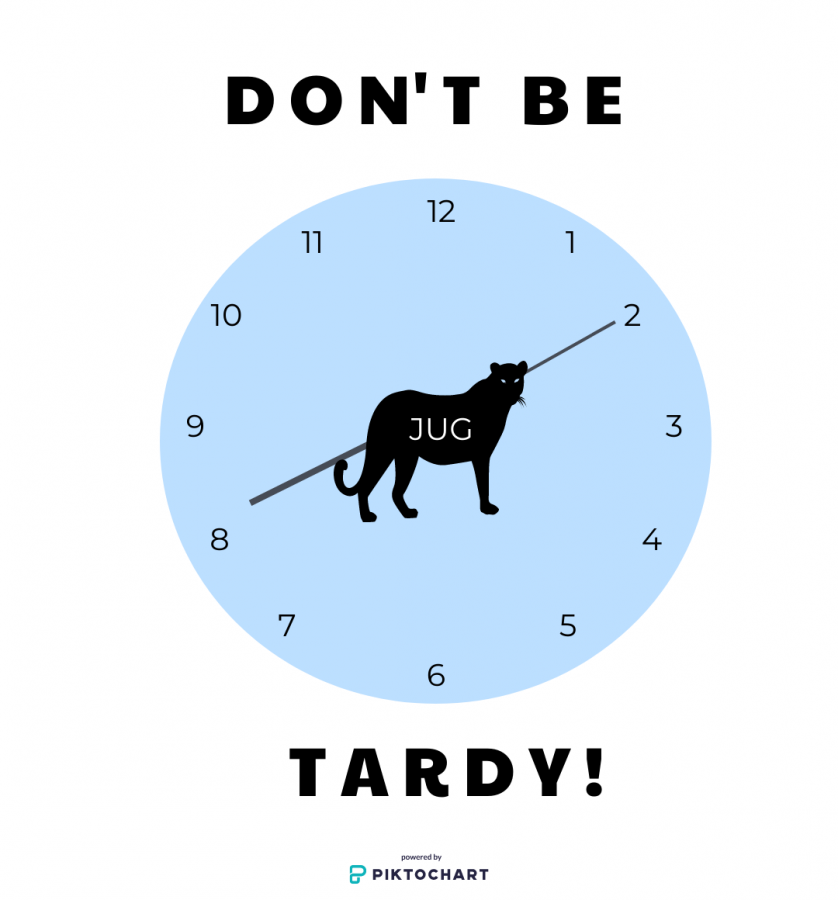You’ll be Sorry if You’re Tardy
New Online JUG Format Put in Place
December 9, 2020
Tardy to class? Racking up those absences? Using “glitch” as an excuse one too many times? These acts could lead to an invitation to the new online friendly version of JUG (deriving from the Latin word ‘Jugum’ or yoke in English). JUG is a unique Jesuit high school version of detention used all over the country.
In life before COVID-19, Seattle Prep students would receive an invitation to JUG from their teacher or an administrator if they were caught out of dress code, chewing gum, receiving three or more tardies in one class, using their phone, the list goes on. JUG was an after-school obligation where students would clean the school for an hour. If a student missed their JUG assignment, an hour would be added on each day. The incentive was high for students to avoid JUG because they had to miss after-school sports practices or rehearsals.
During remote learning, the violations such as a student being out of dress code or on their phone are much more difficult for the school to enforce because teachers can only see a student’s face in Zoom. The new issue for teachers has become students arriving late to their class Zooms or not showing up at all. In the era of the “glitch” excuse, it has been hard to enforce this rule. However, teachers are cracking down. Dean of Students, Mr. Stearns, highlighted, “‘WIFI issues’ is the new version of ‘my dog ate my homework,’ and many excuses I hear include the word “glitch” as an excuse for anything that happens with their Surface.”
While it may be difficult for teachers to punish students for having technology issues, patterns have become apparent in students consistently using the same excuse for their absence and not seeking assistance from tech help. When COVID-19 hit in mid-March, Seattle Prep did not institute an online version of JUG through the end of the 2019-2020 school year because it seemed unnecessary in the temporary situation. However, in the continuation of the remote learning format, the hope of using the term “temporary” has become bleak. In his regular Zoom calls with Deans from other Jesuit schools, Stearns learned that they were implementing online JUG. Stearns decided, “We felt the need to have JUG when it became clear that we would be using online classes for a while and, we needed to address students arriving late to class.”
Together, Mr. Stearns and Mr. Mitchell (“JUG master” and Literature teacher) developed the online JUG format for Seattle Prep. Unlike the previous after-school obligation, this year’s format is before school at 7:15 am. This morning program eliminates the burden of JUG conflicting with after-school practices and rehearsals, but Stearns said, “Since most of the people with JUG have been tardy to their first class, it is a burden for them to have to get up early for JUG.”
Similar to the service aspect of cleaning the school in the traditional JUG format, the new online format focuses on service as well. Students partake in an activity where they “orient their service during online JUG to one of four categories: (1) family, (2) school, (3) city (4) nation.” The new JUG format focuses on the Jesuit value of men and women for others. “The goal is that students would see themselves as citizens of those entities, more than simply as consumers in the world,” said Mitchell.
When asked in a poll on the Prep Instagram, only 13 students out of 240 reported they had experienced online JUG. One sophomore student who wished to remain anonymous said that they learned their lesson after getting online JUG. They said, “I got jug because I had seven tardies to chemistry class.” However, most of them were due to technological issues, and they were “never later than 30 seconds to a minute.”
The issue in this day and age is it is difficult for teachers to discern between an accidental sleep in and WIFI issues. This anonymous student described what they did during JUG, “we got a couple of choices of writing assignments to pass the time. I choose to write letters to two relatives.”
After the students completed the writing assignment, they showed Mitchell their work. While the work was not too strenuous, this student said, “waking up early was definitely the worst part.”
A freshman student also reported that they received JUG for having an “excessive amount of tardies” as their Collegio teacher put it. They also highlighted that Mitchell ensures students are off their phone by having them power it off and show that it is away from them. Just like many Prep experiences, what you put in is what you get out. While it is hard to say whether this new online JUG is effective in encouraging students to go to class on time, Mitchell said, “It depends how seriously the student takes their activity.”
To avoid this early morning burden, take the message from a student who has experienced JUG, Filip Christian ’23, “don’t be late!”



